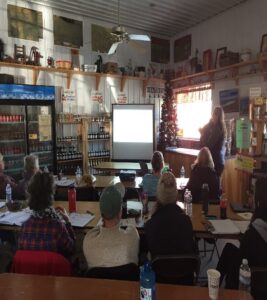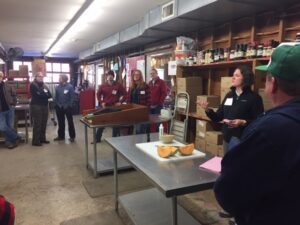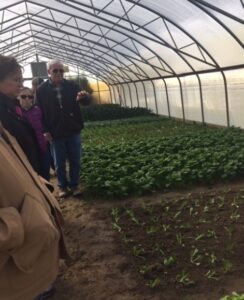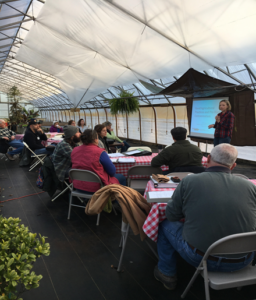Final report for ONE17-295
Project Information
Cooperators
- (Educator)
- (Educator)
Research
Paul Goeringer and Sarah Everhart worked the Maryland Department of Agriculture, the Maryland Department of Health and Mental Hygiene, the University of Maryland, College Park and University of Maryland Extension (collectively the “collaborators”) to review existing food safety training materials and pull from those materials the standards and/or methodologies that can used in the operation-specific curriculum materials. Completed during February- September 2017.
Everhart worked with collaborators and partner farms to schedule trainings and form training agendas. Completed during May-June 2017.
Everhart, in consultation with Michael Pappas, performed research to supplement existing food safety training materials to ensure that the curriculum contains the most up-to-date standards, recommendations and methodologies to plan for and address food safety risks. Completed during March-September 2017.
Everhart created draft curriculum materials for the operation specific food safety risk and recall readiness portions of the trainings and worked with collaborators on their training materials. Completed during February-September 2017.
Everhart made visits to the partnering farmers, discussed topics to be covered at the trainings and inquired as to how the trainings can be enhanced by using demonstrative examples from the host farm sites. Completed during September, 2017.
Pappas reviewed the curriculum materials and offered suggestions to Everhart. Completed during October, 2017.
Everhart and Goeringer created evaluations for distribution following the trainings and webinars to gauge the quality and effectiveness of the trainings. Completed during November, 2017. Work SARE Webinar Evaluation SARE Workshop Evaluation
As a result of this programming, we saw a number of changes by attendees based on the experience through the on-farm trainings. With the six month followup we saw attendees make the following improvements:
- Improved hand washing stations
- Improved workplace sanitation
- Improved harvest tool cleaning procedures
- Focusing on avoiding cross contamination
- Protocols have been established and sanitation occurs more often
- Posted signs
- Temperature sensors remotely monitor cooler
- Replaced light bulbs
- Researched food safe storage shelves
- Made sure that food is only prepped on stainless steel surfaces
- Made sure that employees are not eating food in the food prep area
- Instituted a more consistent use of gloves and adherence to hand washing policies
At the same time, we saw attendees update food safety plans, develop recall plans, and other practices that will help better prepare them to limit food safety issues down the road.
One limitation to our followup evaluations is that we did not take into account changes in profits or costs associated with our programming. This type of information would have been valuable if collected to better help us access the benefits of the programming.
Creating food safety education programming specific to the type of operation was unanimously appealing to farmers and helped them to better understand learn the materials. Although it was daunting to hold food safety education on farms in January, the farmers responded well to the on-farm location and appreciated the hands-on demonstrations. we would like to explore other opportunities to hold food safety trainings on farms.
Having the farmer hosts discuss their farms and approaches to food safety was a good way to open the meetings and it lead to helpful dialogue throughout the trainings. By bringing regulatory and academic experts together the participants were able to gain a full understanding of not just food safety practices but also how an on-farm recall process would unfold.
Education & outreach activities and participation summary
Participation summary:
 Attendees listen to a recall presentation from D’Ann Williams, Maryland Department of Health at agritourism on-farm food safety and recall readiness training, January 25, 2018.
Attendees listen to a recall presentation from D’Ann Williams, Maryland Department of Health at agritourism on-farm food safety and recall readiness training, January 25, 2018.


